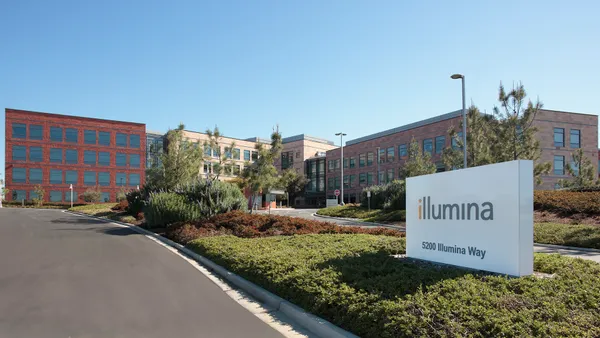Dive Brief:
-
Quest Diagnostics early 2019 earnings have beaten analyst expectations on the back of rising demand for its testing services.
-
Organic growth drove requisition volumes up 3.6% in the first quarter since Quest regained access to UnitedHealthcare's network, although another fall in revenue per requisition offset the rise.
-
Quest cited its newly-expanded network access to explain the volume growth and talked up the prospect of making further market share gains in the coming quarters. Quest released its results shortly after UnitedHealth publicly named the company as part of its preferred lab network (PLN) Monday.
Dive Insight:
Tuesday morning's results are the first Quest has shared since getting back into the UnitedHealth network at the start of the year. The agreement with UnitedHealth has given Quest access to more patient lives than at any time in the past decade. Accordingly, organic requisition volume growth was up 2.4%, compared to 1.1% in the fourth quarter of 2018, and would have been around 3% if headwinds including a slightly shorter quarter were excluded.
CFO Mark Guinan told investors the rate of volume growth was "something we've not seen in a long, long time at Quest." The rate slightly exceeded Quest's expectations, although that was largely due to weather, not faster-than-expected inroads into the UnitedHealth business.
Quest is making inroads, though, and has seen signs that it will win more business over time, executives said.
"The year-over-year growth rate accelerated throughout the quarter. Gaining market share through expanded network access will be a gradual process," Quest CEO Steve Rusckowski said on a call with investors to discuss the first quarter results.
While the UnitedHealth business is new, in many regards Quest's first quarter results align with its final set of financials of 2018. Over both periods, Quest grew requisition volumes by around 3.5%, albeit with less reliance on M&A this quarter, but falling revenue per requisition stopped the company from translating this performance into sales growth. Rusckowski blamed the revenue per requisition trend on the "significant reimbursement pressure" created by the Protecting Access to Medicare Act.
In the first quarter, revenues per requisition fell by 3.0% and sales were flat year over year. With Quest's costs growing as it invests to handle the extra volumes, the decline in revenues per requisition was enough to drive its operating income down by 8.7%.
Analysts were braced for a difficult quarter, though, and Quest's performance was good enough to beat their expectations. Revenue came in at $1.89 billion, compared to a $1.87 billion forecast, and earnings per share of $1.40 beat Wall Street's predictions by a similarly narrow margin.
The inclusion of Quest in UnitedHealth's PLN has been expected since UnitedHealth announced it would end its exclusive relationship with LabCorp and create a network of preferred providers.
With the PLN set to go live at the start of July, UnitedHealth has revealed Quest and LabCorp are both in the network, as is Quest subsidiary AmeriPath. The rest of the PLN is made up of OPKO Health's regional lab Bio-Reference Labs, its genetic testing subsidiary GeneDx and two other organizations likely to focus on genetics, namely Invitae and Mayo Clinic Laboratories.
The breadth of the PLN provides opportunities to funnel work to companies other than Quest and LabCorp. But analysts at Jefferies, who estimate Quest and LabCorp control 25% of the market today, still see the PLN as a driver of market share gains and organic growth in the years to come.
"[UnitedHealth's] rollout of its PLN will translate into meaningful market share gains for [Quest] and [LabCorp]," the Jefferies analysts wrote in a note to investors. "Additionally, we believe that the success of [UnitedHealth's] PLN strategy in reducing overall lab spend while improving service quality levels could prompt other national payors to adopt a similar narrow network strategy for labs that should drive incremental share gains to [Quest] and [LabCorp]."
The analysts expect Quest to start realizing those gains from 2020 onward but the growth in first quarter volumes show it is already benefiting from UnitedHealth's business. With PAMA-related reimbursement pressures set to continue throughout 2019, Quest will need to continue growing volumes in the coming quarters but for now it is on track to hit its full-year targets. Despite beating expectations for the first quarter, Quest maintained its outlook for the full year.












